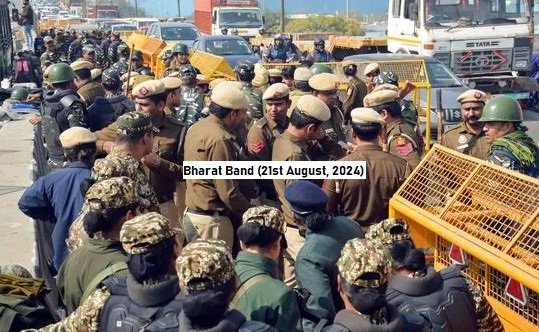AWIP, News Analysis, Social Justice, Society
Q. Give the reasoning behind the recent Bharat Band (nationwide strike) on the issue of reservations for Scheduled Castes (SC), Scheduled Tribes (ST), and Other Backward Classes (OBCs) in India.
The recent Bharat Bandh (nationwide strike) scheduled on 21st August, 2024 was organized to protest against a recent Supreme Court ruling on SC/ST reservations i.e., to exclude the “creamy layer” from SC/ST quota. The “Reservation Bachao Sangharsh Samiti” has called for this protest, which is supported by SC/ST groups mainly from Rajasthan. However, there are several other key factors that has sparked controversy and led to this call for protest.:
- Demand for Caste-based Census: One of the primary demands was the implementation of a caste-based census, which would provide updated and accurate data on the population of various castes, enabling the government to tailor reservations more effectively based on the current demographic situation.
- Concerns Over Reservation Policies: There has been growing concern among various communities that the current reservation policies are either insufficient or improperly implemented. Some groups feel that they are not receiving their fair share of the benefits, while others believe that the criteria for reservations need to be re-evaluated to reflect contemporary socio-economic realities.
- Judicial Decisions and Government Policies: Recent judicial rulings and government policies have caused anxiety among different communities regarding the status and extent of reservations. For instance, any attempt to dilute or redefine the criteria for reservations has led to protests.
- Political Mobilization: The issue of reservations is highly sensitive and politically charged in India. Various political groups and leaders have been mobilizing support around this issue, advocating for or against certain aspects of the reservation system, depending on their constituencies.
- Social Inequality and Discrimination: Despite decades of reservations, social inequalities and discrimination persist, leading to continued demands for affirmative action. Many groups argue that the existing reservation system needs to be strengthened and expanded to address ongoing disparities.
- Economic Insecurity: Economic challenges, including unemployment and poverty, have heightened the demand for reservations as a means of securing jobs and educational opportunities for marginalized communities. The Bandh reflects the broader economic insecurities faced by these communities and their demand for greater state support through reservations.
The Bharat Bandh was a manifestation of these complex socio-political dynamics, with various communities expressing their demands and concerns regarding the future of reservations in India.


